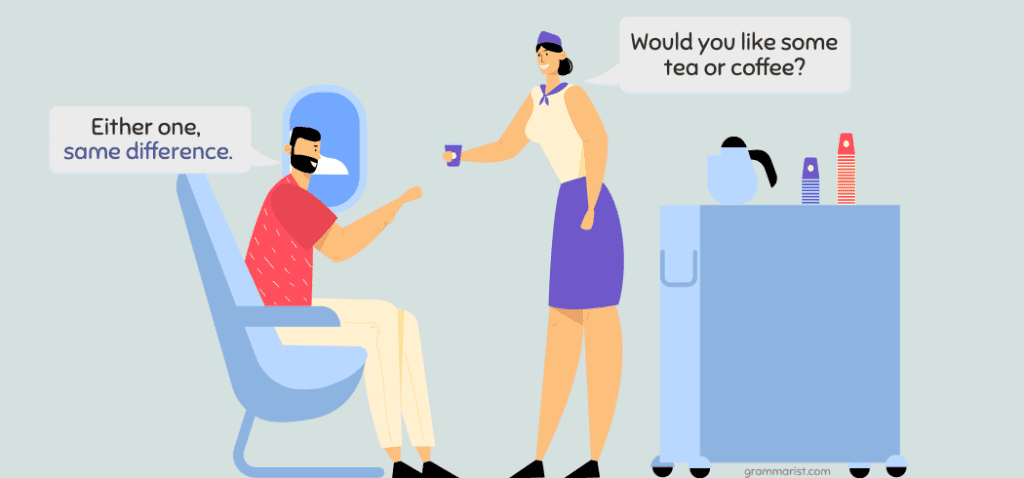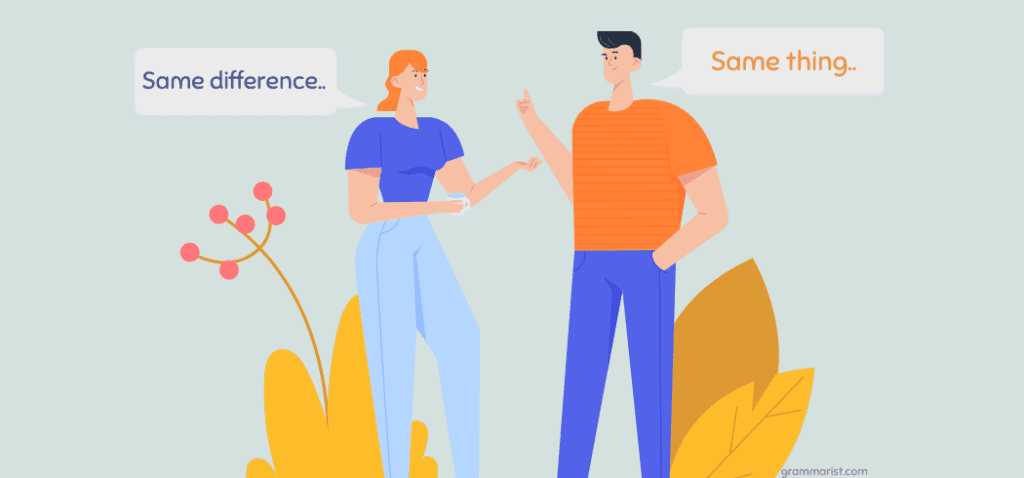Should I work on my latest manuscript this evening or start plotting out my next book? It’s the same difference; I still make progress on my writing goals. See what I did there? Those tasks are two different things but produce the same or at least a similar result. Let’s look at the ‘same difference’ definition and how to use it correctly.
What Does Same Difference Mean?

You’ve definitely used the phrase “same difference.” We all have. And it’s a colloquial expression we use to show that two things are basically the same, even if there are minor differences between them.
Like asking someone if they want tea or coffee, and they reply with, “Either one, same difference.” Tea and coffee are obviously two different things, but similar enough that someone probably wouldn’t care; they just want a hot beverage. It’s the same difference, meaning it doesn’t matter.
Is ‘Same Difference’ an Oxymoron Sentence?
You’d think the phrase ‘same difference’ has an oxymoron meaning, but it actually doesn’t. “Same difference” can easily be considered an oxymoronic phrase simply because the words “same” and “difference” contradict each other, which is technically what an oxymoron is.
But the common phrase is mostly used to express the idea that two things are close enough that it really doesn’t matter which one you choose.
Despite the intentional contradiction, the phrase is actually closer to a form of colloquial or idiomatic language.
Same Difference Origin
The true origin of the phrase “same difference” is unclear. But there is a mention of it as far back as 1929 in “The Lions’ Den,” a Penn State Collegian, and even in a 1934 review of “Gentlemen Are Born,” comparing it to “Little Men” and stating that it’s the same difference.
It’s found in an old entry in the San Bernadino Sun by Bill Corum back in 1937.
“From all appearances they still are the same old [Boston] Braves. Or, if you prefer, the same old Bees. The trade name of Bees makes it easier for sports page headline writers. Possibly, too, for opposing teams. Otherwise it’s the same difference.”
And also, in the Daily Illini in June of 1935, the phrase is used when talking about going for a swim, and someone replies with, “I can’t. I gotta take a bath.”
It’s likely the phrase came about as a colloquial expression used in casual conversation at some point in the recent past. And its usage just spread over time because it made sense to everyone.
I’ve seen and heard it used all my life, and the English language has accepted it since at least the mid-20th century.
It’s also possible it developed as a loose form of sarcasm or irony, with the words “same” and “difference” being used to express the idea that there’s no real difference between two things, even though they appear to be different, like the phrase six of one, half a dozen of the other.
Is It Correct to Say Same Difference?
Yes, it’s totally correct to say “same difference.” While the phrase may seem oxymoronic to some because the words “same” and “difference” appear to contradict each other, most people understand and use it to express a particular idea.
Is ‘Same Thing’ and ‘Same Difference’ the Same?

Sure, the phrases “same thing” and “same difference” have a similar meaning to refer to two or more things as inherently the same or the difference doesn’t matter.
But the phrase “same thing” comes across as more straightforward and directly conveys the idea of two things being equal.
“Same difference” has a slightly more colloquial or informal tone, and you can use it to convey a sense of sarcasm or irony.
Either way, both phrases are easily understood in English, but “same thing” is generally considered a more standard expression. I guess you could say it’s the same difference!
Same Difference Synonyms
- It’s all the same
- No difference
- Makes no difference
- Equivalent
- Interchangeable
- Indistinguishable
- Identical
- Similar
- Equally valid
Examples of Using ‘Same Difference’ in a Sentence
- We asked for a car, but you gave us bikes. Oh, well. It’s the same difference; we can still get around.
- I prefer tea to coffee, but my friend prefers coffee to tea. It’s the same difference; we both get to enjoy a hot drink.
- My husband wanted to go to the mountains, but I wanted to go to the beach. It’s the same difference. We both get to enjoy a beautiful natural setting.
- Taking a bus or taxi is the same difference. We still get to our destination.
- I prefer red wine, but my husband likes white wine better. It’s the same difference for me.
The figures on the latter are Bacchus and Venus, not Pettit and Wizenberg, though some might say, same difference. (The Seattle Times)
Final Words
And there you have it, all wrapped up in a neat bow. I hope my quick guide on the meaning and proper usage of the phrase ‘same difference’ has helped you understand it a bit better. Just remember, it’s a real phrase, it’s correct, and it can be used literally or in a joking way.
